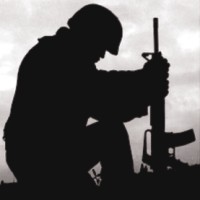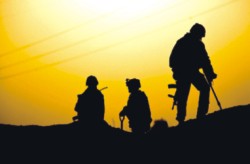| Home - Back Issues - The Team - Contact Us |
 |
| Volume 10 |Issue 12 | March 25, 2011 | |
|
|
Food for Thought Memories of 1971 Farah Ghuznavi
As the article went on to argue on a lighter note, the issue of how writing might affect people not prone to depression also raises some interesting questions. After all, if you take an otherwise healthy person, shut him up alone for hours at a time, day after day, month after month, year after year, watch him pack on the pounds as physical exercise becomes a thing of the past, ask him to write, knowing that the end result can never be perfect - and, for good measure, tell him there's no way of guaranteeing if he'll be published, or paid - the results could quite reasonably be expected to be alarming. But looking on the positive side, if happy people might not want to risk becoming writers, then those who in any case have "heavy heads" (as a good friend of mine likes to put it), might have less to lose. In fact, given how cathartic writing can be, they could have a lot to gain. I was reminded of all this at a talk recently organised by the BRAC Development Institute (BDI) with the 1971 Collective and other partners that brought together academics and activists from India, Pakistan and Bangladesh to discuss the Liberation War of 1971. One of the speakers was a Pakistani man – Nadir Ali - who is an ex-lieutenant colonel and was part of the occupying Pakistani forces in Bangladesh in 1971. He said a number of interesting and very moving things about his time here. I don't have space to go into all of it, but in Ali's own words the experience led to him "spending three years in the nuthouse". Given attitudes towards mental health in this part of the world, a public admission of that nature is unusual enough; but given that he was sharing his wartime experiences with people who had lived through it as victims, I was awed by his brutal honesty about the war, the role played by his nation, and what he saw and did himself. He had never killed civilians, or sanctioned such killings, Ali stated quite clearly. But he went on to say that that did not vindicate him in any way; not in the eyes of the world, not before those of us who were judging him, and certainly not for all the times that he found he was standing in judgment of himself.
Another time, he ended up freeing a man being beaten by collaborators for supposedly raising funds for the freedom fighters. On this occasion too, the soldiers under his command had wanted to shoot the man concerned. In another, very painful instance, Ali was not so lucky in carrying off his attempted rescue. He was sharply reprimanded by his commanding officer for assigning soldiers to protect a group of Hindus who had been attacked by collaborators, where a number of children had also been hurt. He was peremptorily and callously instructed to "get rid of them" by whatever means necessary. The attitudes of his fellow officers were, by and large, dissimilar to his own – they had few qualms about following orders, and in some cases, did so with gusto. Ali recalled one of his colleagues rejoicing on a day when he claimed to have killed a number of unarmed freedom fighters in Feni, brush firing into their midst during a daylight gathering by the river. He said, "I told him, those were not freedom fighters; they would never gather in large numbers during the day in an exposed area. It was a very hot day, and they were probably villagers who had come there in the hope of catching a breeze." My fellow officer responded, 'Who cares?! They were all bastard Bengals anyway!'" Perhaps unsurprisingly, Nadir Ali's nervous breakdown was already underway by the time he left Bangladesh; and the day before departure when he went to take leave of his commanding officer, the man prevented him from seeing the senior general. Asked why, he later told Ali that he had in fact arrived dressed in a dhoti, and would have risked severe punishment if the general had seen him wearing clothing associated with not only Bengalis, but Hindu Bengalis. Ali said, “I told him, 'You shouldn't have stopped me. I wanted to tell the general that I am a Bengali now.' I was already living in a different place in my head by then, one that didn't exist!” One can only be grateful that his commanding officer turned him away; otherwise it's possible that he would not have survived to tell the tale. After his discharge from the Pakistan army on the grounds of disability in 1973, Ali went through the near impossible task of, as he described it, putting himself back together; and in that process, rediscovering himself as a person. It must have been a lonely process, since the wider environment in Pakistani society at the time was not remotely sympathetic to his situation. Ali credits his wife for somehow holding things together for the family during that time. He began writing prose and poetry in his mother tongue, Punjabi. Interestingly, he credits his encounter with the Bangla language for bringing him back to his own - both through understanding the crucial importance of our language to the construction of the Bengali identity, and to his realisation that - as his first language – Punjabi would be the best way of communicating his thoughts and ideas to the wider world. His first volume of poetry was dominated by his Bangladesh experience. I recently read something by the writer John Rember, who said, addressing others who write: There is something inside of you that is damaging your life. There is in most people who get involved in this business. One of the great challenges of life is to turn weaknesses into strengths, evils into good things, and we're never finished with it until we're dead. Writing is the best way I know to grasp those dark things we don't know about ourselves and begin to work with them, and to finally see what the mirror is trying so hard to tell us. Listening to Nadir Ali speak, I realised that this is one man who has not only reached deep into himself to grasp those dark things - some too terrible to bear - he has emerged tempered by the experience; and against all odds, able to face himself in the mirror.
Copyright
(R) thedailystar.net 2010 |
 T
T Ali was appalled by what the army expected him to do, and followed his conscience more loyally than army policy. On one occasion, accompanied by the soldiers in his battalion, he encountered a Hindu doctor who was stopped and required to identify himself. Since the man's name gave away his religious identity, Ali found himself obliquely warning him to be careful about providing information when asked for his name in those troubled times, and sent him on his way. When one of the soldiers accompanying him asked if he should shoot the departing doctor (for being a Hindu), Ali responded, "If you touch your rifle, I will shoot you."
Ali was appalled by what the army expected him to do, and followed his conscience more loyally than army policy. On one occasion, accompanied by the soldiers in his battalion, he encountered a Hindu doctor who was stopped and required to identify himself. Since the man's name gave away his religious identity, Ali found himself obliquely warning him to be careful about providing information when asked for his name in those troubled times, and sent him on his way. When one of the soldiers accompanying him asked if he should shoot the departing doctor (for being a Hindu), Ali responded, "If you touch your rifle, I will shoot you."